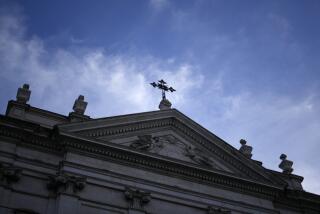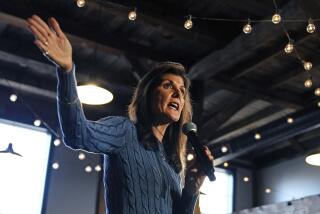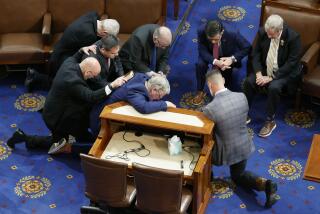It’s about voters’ faith in Romney
With a massive marketing effort, Mitt Romney has tried to introduce himself as a family man with a solid marriage, five wholesome sons and the moral values desired by the Republican Party’s most conservative voters.
But now that voters have met him, many are ready to offer an opinion: They still do not know who he is.
Some voters are holding Romney’s Mormon heritage against him, rivals and supporters of Romney acknowledge. But a new Los Angeles Times/Bloomberg poll shows that his deeper problem is not his adherence to a faith that many conservative evangelicals view with skepticism.
Instead, Romney has not overcome a record of shifting views on abortion and other social issues. His failure to present a clear picture of his faith and its role in his life appears to be just one part of a broader challenge: proving to GOP voters that he is being straightforward with them.
Romney’s predicament is underscored in the new poll, which found that he ranked last when Republican voters were asked which of the top-tier GOP candidates were “best at saying what they believe, rather than saying what they think the voters want to hear.”
Just 8% said Romney was best at saying what he believes, compared with 18% for former New York Mayor Rudolph W. Giuliani, the national front-runner, and 20% for Mike Huckabee, former Arkansas governor, who has sprung from near obscurity to a leading position in Iowa.
While Romney has scheduled a speech for Thursday in Texas to address questions of faith, the new survey suggests that the broader authenticity question is more damaging to his candidacy than religion.
Some 13% of Republican voters in the Times/Bloomberg poll said Romney’s Mormon faith made them less likely to vote for him, including 8% who said it made them “much less likely.”
But 10% said Romney’s religion made it more likely they would support him. And an overwhelming 73% said it made no difference.
“The religion part has never bothered me,” said poll respondent Jenelle Pritchard, 43, a school administrator from Omaha, who is an observant Catholic and has decided to support Huckabee. “But with Romney, I really don’t know where he stands. You can transform yourself, but why are you transforming yourself?”
Respondent Richard Wilson, 67, a school board president in Harrisburg, Pa., said that Romney’s Mormonism “is not an issue to me.”
“I look to more how he would handle the country,” Wilson said. “I thought he seemed a little wishy-washy, like he’s not quite sure what he would do and is trying to be political. It shouldn’t be hard for someone to say what’s on his mind.”
The poll findings suggest that Romney’s image has suffered from his record of shifting on key social issues from his earlier Massachusetts campaigns for the Senate, which he lost, and for governor, which he won. In those races, he ran as a moderate who supported abortion rights, courted gays, backed gun control and teamed up with environmentalists.
As a presidential candidate this year, Romney has assiduously courted the party’s most conservative and religious voters, promoting his changes of heart on abortion and other issues and presenting himself as the most conservative candidate in the GOP field.
“The huge pothole in the road for Romney isn’t necessarily the Mormonism as much as it is the authenticity issue,” wrote David Brody, a blogger and reporter for the Christian Broadcast Network, who often vets presidential candidates on behalf of his conservative Christian audience.
At times, Romney has deflected questions about Mormonism, and at times he has tried to highlight what it has in common with mainstream Christianity.
But that has drawn criticism from some who say he should embrace Mormonism, with its reliance on theology delivered by the 19th-century prophet Joseph Smith, as a distinct faith with some views that are very different from those of other Christian denominations.
Romney may have deepened his problems when, during last week’s CNN-YouTube debate, he used halting and uncertain language when asked whether he believed “every word” of the Bible was true.
“You know -- yes, I believe it’s the word of God, the Bible is the word of God. . . . I mean, I might interpret the word differently than you interpret the word,” he said, appearing to walk a rhetorical tightrope between offending evangelicals and more fully depicting his own faith, which accepts the New Testament, but views it as incomplete.
Romney’s strategy of creating a slingshot of momentum by wooing voters in early-voting Iowa and New Hampshire seemed to be working, until now.
In recent days, Huckabee, a former Southern Baptist preacher, has been drawing more support in Iowa from religious conservatives, suddenly making him the front-runner or tied with Romney for the lead.
But Romney and his aides know that their most important challenge is convincing a broader electorate that he is an authentic leader who stands up for his beliefs. That explains why, as Romney himself said this week, his speech is not intended to lay out the tenets of Mormonism but rather to present himself as a champion of religious liberty.
Romney aides believe that the expected media attention to the speech hands the candidate an unusual platform to convey strength and conviction.
The speech, titled “Faith in America,” will take place at the George H.W. Bush presidential library in College Station, Texas, not far from Houston where in 1960 then-Sen. John F. Kennedy raised similar points in an address designed to allay concerns about his Catholicism.
But while Kennedy’s goal was to pledge his independence from the Vatican, Romney faces a steeper challenge: introducing not only his faith but himself. Romney aides acknowledge that the intended audience for Thursday’s speech is broader than the few voters who are distrustful of Mormonism.
“It’s very rare you’ll find a moment where all the other candidates will stop and listen to a speech,” leaving room for one candidate’s voice to be heard, said Romney spokesman Kevin Madden. “This could be one of them.”
Times staff writer Janet Hook contributed to this report.
More to Read
Start your day right
Sign up for Essential California for news, features and recommendations from the L.A. Times and beyond in your inbox six days a week.
You may occasionally receive promotional content from the Los Angeles Times.






